Goodman:One of the many lessons I drew from The Commission is the potential outsized role of senior staff positions – individuals who received less public scrutiny but who were highly influential in directing the course of the investigation and drafting the final report. Do you think that was potentially unique to the 9/11 Commission due to its particular officeholders and its particular circumstances?
Shenon: The staff of the 9/11 commission was exceptionally talented. Lots of policy experts and smart lawyers. But when it came to influence, only one staffer had real power – the intelligent and abrasive executive director, Philip Zelikow, the University of Virginia history professor. I’d argue he was more influential than several of the 10 commissioners when it came to writing the final report. At the end of the investigation, many staffers felt their most important and controversial conclusions were not reflected in the report’s findings, especially when it came to demanding accountability in the Bush administration for the intelligence failures that led to 9/11. That was also true about the evidence of possible Saudi government ties to the conspiracy. The choice of an executive director – to run the day-to-day investigation—is vital. I think the 1/6 commission should be on the lookout for someone as smart as Zelikow but more willing to share authority and with fewer conflicts of interest. (Zelikow was close to Condi Rice and had been on the Bush administration’s White House transition team in 2000, with responsibility for national-security issues. That still astonishes me.) Certainly the staffers of the 1/6 commission should have much greater — maybe even guaranteed — access to the 10 commissioners.
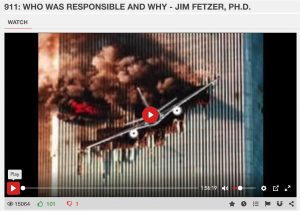
Jim Fetzer, “9/11: Who was responsible and why” (29 January 2018)
Goodman:
One of the comparative advantages of the 9/11 Commission was the ability to obtain information from the government where a congressional Joint Select Committee had previously failed. That included the testimony of the incumbent National Security Advisor Condi Rice and Presidential Daily Briefs. What factors do you think account for the ability to obtain that information and do you think an independent commission that investigates the January 6 attack would have a similar advantage compared to congressional investigations?
Shenon:
The joint House-Senate 9/11 committee (led by the very talented staff director Eleanor Hill and the dogged Senator Bob Graham of Florida) actually got much of the same basic information as the 9/11 commission. But the Congressional report was not so well packaged as the 9/11 commission’s, and the Bush White House refused to release portions of the Congressional findings, so the House-Senate report looked incomplete — and it was, since big blocks of text had to be blacked out. The 9/11 commission got access to Condi Rice, but she was not the least bit forthcoming – and in many ways, I’d argue, misled the investigation about what happened inside the White House in the months before the attacks. The commission, unlike Congress, did get to interview Bush and Cheney privately, which was valuable, although that interview was not recorded. (I certainly think the 1/6 commission should seek interviews, if not depositions or public testimony, with both Trump and Pence, especially since they are both private citizens now.) The 9/11 commission got access to the PDBs, but it turned out that much of the same information was available in other, more widely circulated daily intelligence reports, and those were available to Congress. I think the real advantages that the 9/11 commission had were time (20 months, which was probably still not enough), the perception of greater bipartisanship and high-wattage public hearings. The 1/6 commission will want all of that.
Goodman:
You wrote about how the members of the 9/11 Commission were split on the question whether to start out with subpoenas or hold off until other efforts such as voluntary requests had first failed. The Chair and Vice Chair decided to hold off on subpoenas to use them only in case of intransigence in getting the information they needed. The January 6 Commission may not have the luxury of time to wait to use subpoenas given the short deadline before it may have to issue a final report. How do you think that dynamic may influence the course of a January 6 Commission?
Shenon: I suspect subpoena power will be critical to the 1/6 commission, given how reluctant central witnesses will be to testify. The Mueller investigation teaches us that Trump and associates will fight to the end to avoid testimony or turning over evidence. I think the history of the 9/11 commission shows (and many of the commissioners would agree) that subpoenas should have been issued earlier and more often. An early, sadly rejected proposal before the 9/11 commission – offered by one of the Democratic members, former Deputy Attorney General Jamie Gorelick — was to make subpoenas routine and attach them to virtually all requests for testimony and evidence. The 1/6 commission should seriously consider doing that.
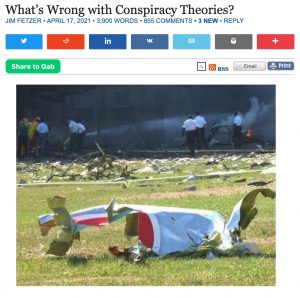
Jim Fetzer, “What’s Wrong with Conspiracy Theories?” (17 May 2021)
Shenon: I’m sure we’ll see that same tradeoff debated. And given how much more partisan these times are, it will be a more heated and maybe ugly debate. I suspect if there’s true personal accountability as a result of 1/6 investigations, it will come in criminal courts, not from the commission. Still, well-run public hearings, at which witnesses are put under oath and really grilled and confronted with the evidence against them, may give the public a feeling of accountability that the commission’s final report will not.
Goodman:The 9/11 Families played an important role in shaping the construction, proceedings, and outcome of the 9/11 Commission. Do you think there is any constituency that might perform a similar function in the establishment and work of the January 6 Commission? If not, should that absence make us concerned about the prospect of the commission’s success?
Shenon: Well, Congresswoman Cheney seems eager to take on that role – and I suspect her father is active behind the scenes in shaping her strategy. And other pressure for the facts will come from DOJ, the FBI and the courts, which seem determined to bring the 1/6 rioters to justice. Those plea agreements and convictions are likely to shake loose evidence – maybe about ties between the rioters and members of Congress or others in government — that will shape what the 1/6 commission does.
Goodman: Are there other lessons from the experience of the 9/11 Commission that you think should guide the public understanding and/or media coverage of a January 6 Commission? Are there other lessons for how a January 6 commission members and their staff should envision their mandate and carry out their work?
Shenon: One lesson, I think, is to make no early judgements about where this investigation will go and how long it will take. The central outline of the 9/11 commission report was written even before the staff got to work, which was a mistake (and certainly created suspicion among some staffers that the outcome was predetermined). The draft legislation suggests the 1/6 commission will wrap up by the end of the year, which seems an impossible deadline. Setting up a federal commission is like setting up a small federal agency. Just finding office space and establishing a payroll system can take weeks or months. Staffers will need security clearances. Better, I think, to mandate lots of public hearings and an authoritative preliminary report by the end of the year, with a final report sometime in 2022.
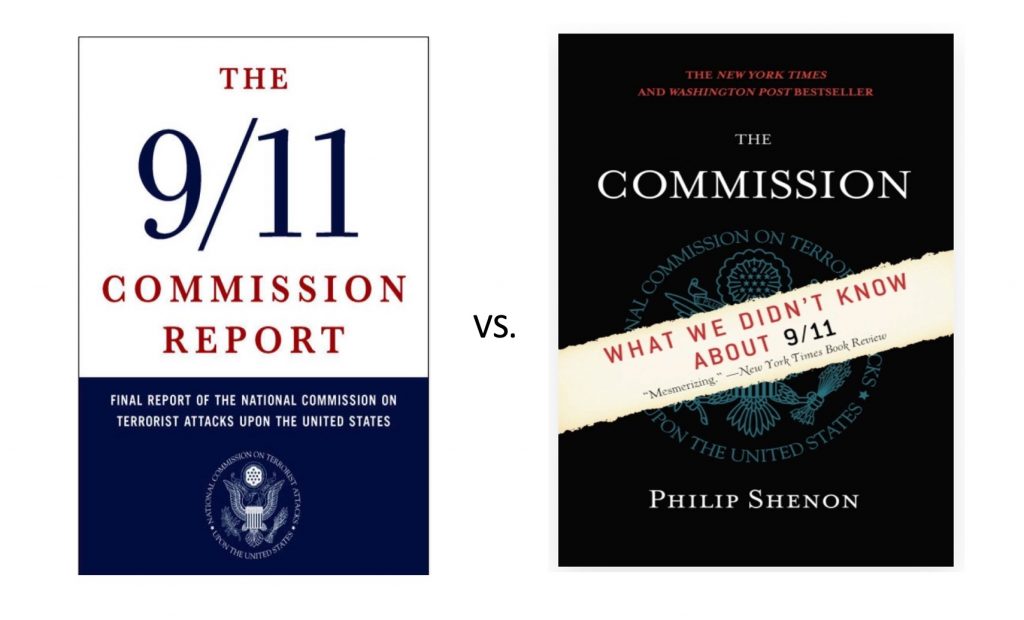
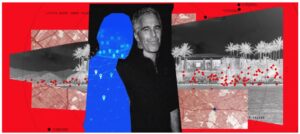
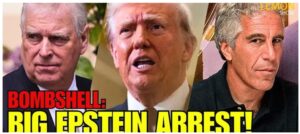
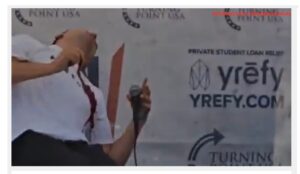
Studying the work of the 911 commission with a view towards expediting factual investigations is rather like analyzing the work of chicken-stealing weasels in promoting better animal husbandry. Rule Number One: don’t hire liars, swindlers, and soulless shills to assay the truth.
All you need to know is that most of the 911 Commission Report was written by Zelikow– a grand guru on how to create public myths– before it even met.
These commissions are almost universally created to reinforce the offical native which more often than not is shown by independent investigators to be false. The commission would first have to get to the bottom of the Nov. 3rd election anomalies where the candidate who was attracting very large crowds with intense enthusiasm was allegedly beaten by an incoherent individual who attracted the most meager of crowds and non-existent enthusiasm. You can take it to the bank with almost absolute certainty that any Jan 6th commission will not get to the truth of what actually occurred on Jan 6th and which was already blamed on President Trump with no investigation whatsoever. The commission itself will be just another “big lie.” It is not going to discover that the event was staged as a psy-op which used to reinforce the extremely negative outcome of the fraudulent election based largely on phantom votes and voters.
The perfect pattern for these bogus commission reports is the one they did on the JFK murder. Several of the commission members were Kennedy haters and most of the relevant witnesses were ignored.
You got that right, mate.